UK press conference beginspublished at 17:02 BST 1 May 2020
UK Health Secretary Matt Hancock now begins today’s coronavirus briefing.
The US Food and Drug Administration gives emergency approval for the experimental antiviral drug remdesivir
Gilead Sciences is donating 1.5 million vials of the drug to help patients
Health Secretary Matt Hancock says there has been an "unprecedented" rise in coronavirus testing in the UK
He says the target of 100,000 daily tests has been met - Labour says the figures are misleading
Millions of children risk missing out on vital vaccines as shipments are delayed because of the pandemic's impact on aviation, the UN warns
May Day rallies take place globally in support of workers' rights - but in scaled back or socially-distanced form
More than 1,014,000 people known to have had the virus globally have recovered, Johns Hopkins University says
Edited by Rebecca Seales
UK Health Secretary Matt Hancock now begins today’s coronavirus briefing.
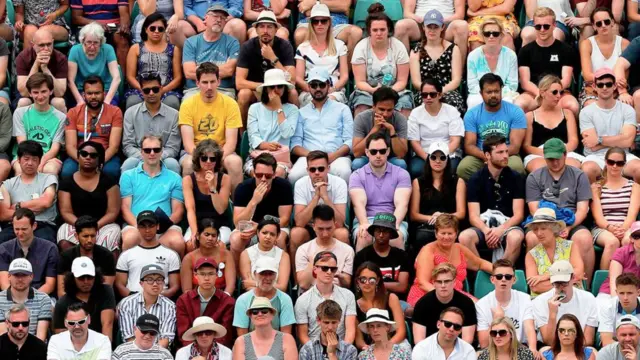 Image source, Getty Images
Image source, Getty ImagesThe UK government’s daily briefing is due to start in the next few minutes.
In the meantime, why not read our correspondents’ takes on how coronavirus will change the way we live.
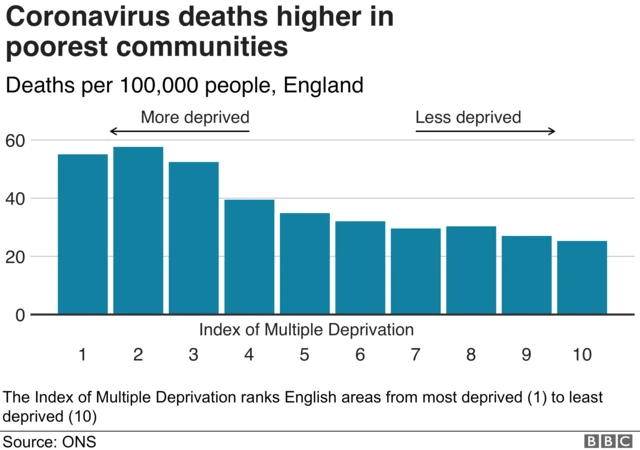
Earlier, we mentioned that the rate of deaths involving Covid-19 is roughly twice as high in the most deprived areas of England and Wales than in the least deprived, according to data released by the Office for National Statistics.
Labour's shadow health secretary, Jonathan Ashworth, said the figures were "devastating confirmation that the virus thrives on inequality".
"Labour has long warned of shameful health inequalities which mean the poorest contract illness earlier in life and die sooner," he said.
Imran Hussain, director of policy and campaigns at Action for Children, said "investing in the nation's health means tackling poverty".
"Those on low incomes are more likely not only to have poorer underlying health but also work in jobs that put them at greater risk of exposure to the coronavirus," he added.
We should be hearing from the UK government in the next 15 minutes.
But while we wait for the latest updates, watch this video on the challenges for Muslims who're observing Ramadan during these unusual circumstances.
Many are spending Ramadan apart to avoid the spread of the Coronavirus.
The University of Texas has been asked by US federal investigators to provide documentation of its relationship with the Wuhan Institute of Virology, which US officials are investigating as a possible source of the global coronavirus outbreak.
A letter sent by the US Department of Education to the university requests documentation of contracts or gifts exchanged between the two institutions.
It comes as part of a broader probe of how US universities get their money, reports the Wall Street Journal.
The US national intelligence director's office said on Thursday that it was investigating the Chinese lab theory, but that it had determined Covid-19 "was not man-made or genetically modified".
But President Donald Trump later said he had seen evidence that the Wuhan Institute of Virology was the source of the outbreak, which China denies.
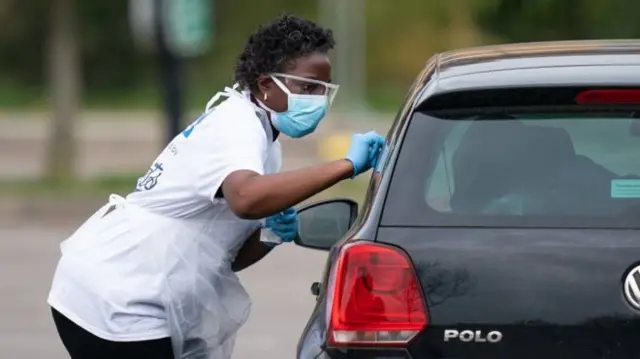 Image source, PA Media
Image source, PA MediaWe should be hearing from the UK government in the next 30 minutes, but let’s take a look at the latest from the country first:
 Barbara Plett Usher
Barbara Plett Usher
BBC News, Washington
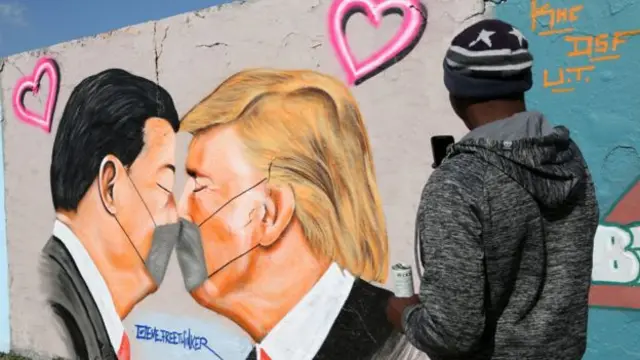 Image source, Getty Images
Image source, Getty ImagesTensions between the US and China are longstanding, but the pandemic and a looming presidential election in the US have amplified the rivalry, and this week the war of words hit a new peak.
So what's the US strategy?
This week President Donald Trump turned a corner with his 2020 re-election campaign.
"China will do anything they can to have me lose this race," he told Reuters news agency.
His sharpening rhetoric against Beijing marked a new phase in an effort to reframe an election that's been reshaped by the coronavirus pandemic. And it signalled rockier times for the already rocky relationship between the world's two biggest economies.
An ancient tradition to celebrate May Day is bringing people together during lockdown.
People across England are posting videos of maypole dancing online to celebrate the coming of summer.
Claire Butler, who is behind the online revival, said it gave people "a shared sense of togetherness". Watch how they're doing it while keeping safe:
Coronavirus: Virtual maypole dancing brings people together
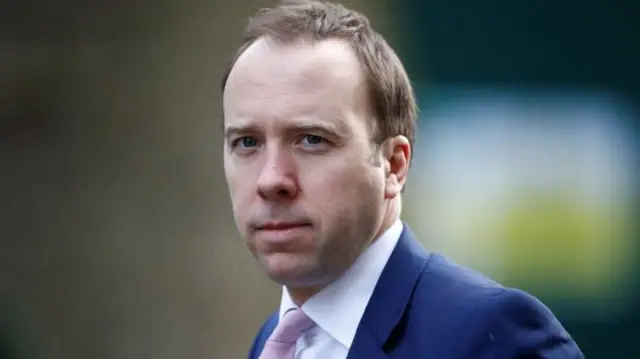 Image source, Reuters
Image source, ReutersHealth Secretary Matt Hancock will be leading today's UK government press briefing
We have just had it confirmed that the UK government will give its daily briefing at 17:00 BST (16:00 GMT).
It will be led by Health Secretary Matt Hancock - as we wait to hear if his target of carrying out 100,000 tests a day by the end of April has been met.
He will be joined by the UK co-ordinator of testing, Professor John Newton, and the medical director of NHS England, Professor Stephen Powis.
We will bring you all the updates from the briefing here.
NHS England has announced 352 new deaths of people who tested positive for Covid-19, bringing the total number of confirmed reported deaths in hospitals in England to 20,483.
The 352 patients were aged between 30 and 103 years old, and 18 of them (aged between 43 and 98) had no known underlying health condition.
These figures are separate to the UK-wide figures released each day by the Department of Health and Social Care, which collate data to different cut-off times.
As of Wednesday, these UK-wide figures also include deaths in care homes and the wider community.
 Mark Easton
Mark Easton
Home editor
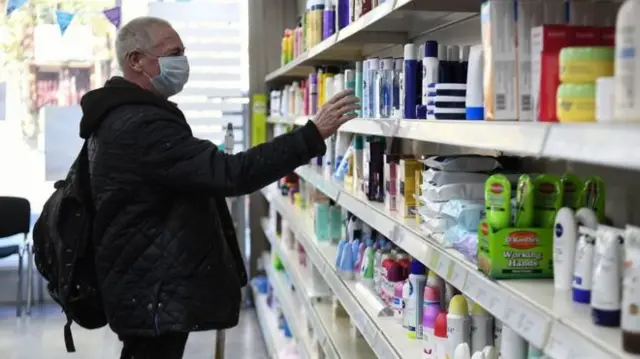 Image source, PA Media
Image source, PA MediaWhen the lockdown first started in the UK in the final week of March there was widespread support for the measures aimed at controlling the coronavirus.
But have attitudes changed or do people still support the ongoing restrictions?
The country will soon enter its seventh week under lockdown.
According to the most recent polling data, many say they would be uncomfortable leaving home even if the government ordered the lifting of the restrictions in a month's time.
 Robert Cuffe
Robert Cuffe
BBC head of statistics
Statisticians advise not to use the daily reported figures. They prefer an analysis that looks at all deaths, but takes account of the average age in a country.
What's wrong with the daily figures?
The definition changes across countries - some only include hospital deaths, some include care homes too.
Belgium includes deaths where Covid-19 is suspected to have contributed, for example, whereas the UK only includes people who tested positive for Covid-19.
When every country counts things differently, statisticians turn to a different measure - with a simpler definition.
Counting 'excess deaths'
If you look at all deaths in a country, irrespective of cause, you will capture the deaths missed by lab testing, misdiagnosed deaths and deaths caused by the strain the virus puts on our society. Of course, you'll capture the heart attacks and car accidents that might have happened anyway.
But the total number of deaths registered in a week normally follows a predictable pattern.
It has shot up since the end of March, running far higher than the previous weeks or what would be expected at this time of year. These extra deaths are largely attributed to the pandemic.
And it's these extra or “excess” deaths, the difference between the number we normally see and what we're seeing at the moment, that statisticians use to capture the true toll of the coronavirus.
Adjust for age
You also need to account for how old the population is, because the coronavirus is most dangerous to older people. So you'd expect to see more excess deaths in Italy, where the average age is 47, than in Ireland, where it's 37.
Once you've done that calculation, known in the jargon as "excess all cause mortality adjusted for age", then you get a clearer picture of how different nations are doing.
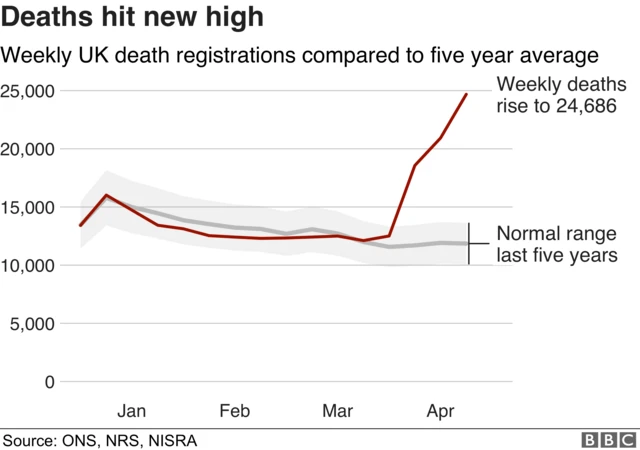
Rugby league in England will receive £16m in government loans to help it recover from the impact of the pandemic.
Rugby Football League (RFL) chief executive Ralph Rimmer asked for assistance after the suspension of the game on 16 March.
Culture Secretary Oliver Dowden said the government had intervened "to protect an entire sport". Rugby league is seen as a special case because of its social value in mainly northern communities.
"Rugby league is not a wealthy sport. But it is rich in the things that matter most - outstanding sporting and life chances in often disadvantaged communities," said Mr Rimmer.
"This support enables the sport to survive, to reshape, to be ready to restart in this our 125th year and to look to a home World Cup."
England is set to host the World Cup in 2021, from 23 October to 27 November, with 16 of the 18 venues being in the north.
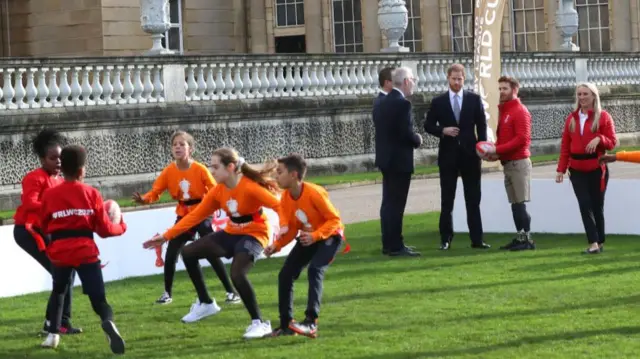 Image source, Getty Images
Image source, Getty ImagesPrince Harry is the RFL Patron and hosted the draws for the men's, women's and wheelchair World Cup at Buckingham Palace in January
If you're just joining us, here are the latest headlines from around the world:
Nick Thorpe, BBC News
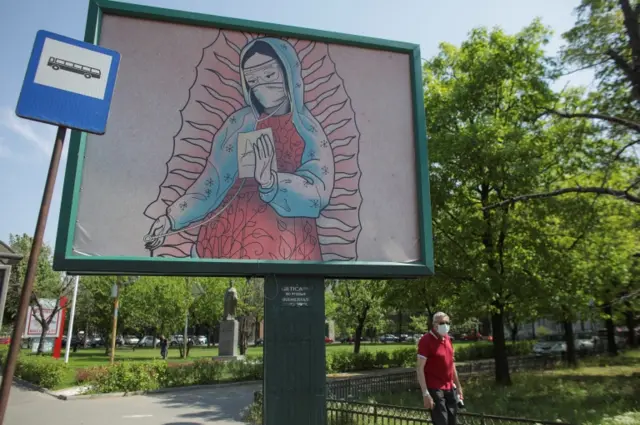 Image source, Reuters
Image source, ReutersRomania's Orthodox Church says posters portraying doctors as saints are blasphemous
The Orthodox Church in Romania has reacted angrily to posters portraying doctors as saints with haloes, suggesting the images are blasphemous.
The agency which devised the posters says it meant no offence, and was simply trying to thank medical staff for their efforts to tackle the coronavirus.
A spokesman for the church condemned the poster campaign as a "caricature" of Christianity, "marked by bad taste and fed by ignorance and a hideous ideology".
The McCann advertising agency defended its posters as a brave artistic choice, and a sign of gratitude to health workers.
But the city council of the country's capital, Bucharest, said it would ask for them to be replaced.
Some 12,000 Romanians are known to have caught the coronavirus so far, and more than 700 have died.
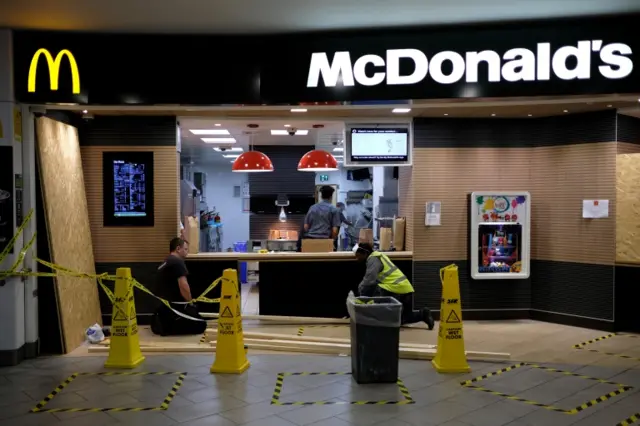 Image source, Getty Images
Image source, Getty ImagesMcDonald's was forced to close restaurants due to the coronavirus lockdown
McDonald's has said it will start reopening some of its UK restaurants for delivery on 13 May after shutting sites due to the coronavirus lockdown.
The fast-food chain said it would reopen 15 restaurants for delivery only, with the locations being announced next week.
This week, KFC said it had already reopened 20 restaurants and planned to open another 80 next week.
Burger King, Nando's and Pret A Manger have also opened some sites for delivery and takeaway in the past week.
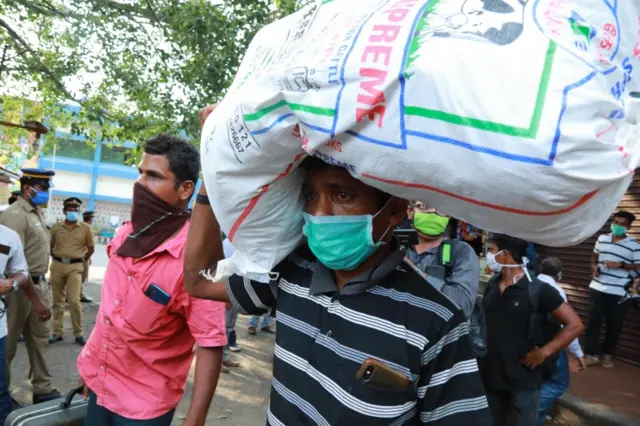 Image source, Getty Images
Image source, Getty ImagesStranded migrant workers are being allowed to return home
India's nationwide lockdown has been extended for another two weeks from 4 May.
The restrictions came into effect on 25 March, leaving millions of people stranded.
On Friday, the first train carrying migrant workers stranded by the lockdown left the southern state of Telangana bound for Jharkhand.
India was one of the first countries to impose heavy travel restrictions, including suspending most visas and eventually stopping all international flights. It also banned trains and flights within the country when the lockdown began.
More than 1,100 people have died after contracting the virus in India, according to the health ministry.
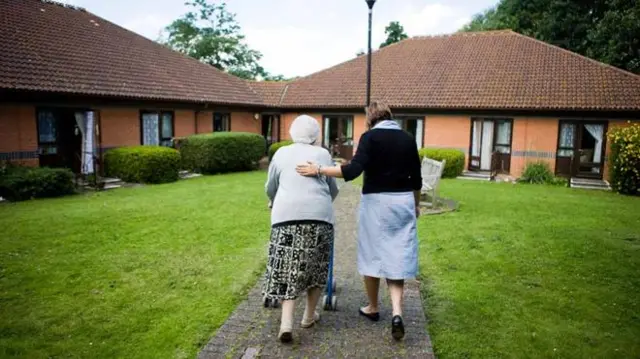 Image source, Alamy
Image source, AlamyThe scale of coronavirus deaths in the UK's care homes is becoming more apparent as the crisis continues.
Here the BBC looks at the issue in depth.
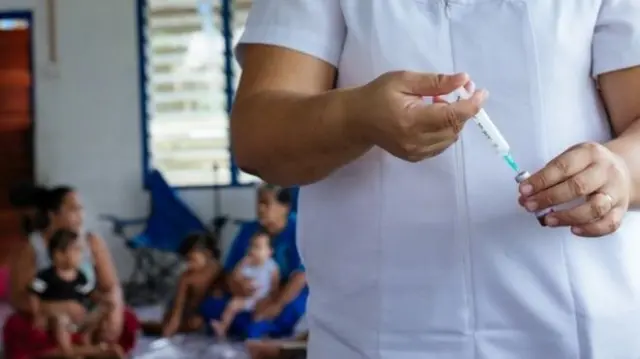 Image source, Unicef
Image source, UnicefMillions of children risk missing "life-saving" vaccines, the UN has warned, after a "massive backlog" of shipments built up due to the coronavirus pandemic.
The outbreak has had a huge impact on the air industry, drastically reducing commercial and charter flights.
This means that dozens of countries are at risk of running out of vital vaccines, the UN children's agency Unicef says.
It wants governments and the private sector to free up freight space.
The UK government stands ready to help those affected by job cuts at Ryanair and other airlines and could discuss “bespoke support” for aviation firms “as a last resort”, Downing Street has said.
The prime minister’s spokesman said: “We recognise this is a very difficult time for employees and their families” who he said would have access "to a broad range of support including Universal Credit and Jobseeker's Allowance”.
The aviation sector is an "important" part of the UK economy, the spokesman said, and firms could "draw upon the unprecedented measures we have put in place”.
“If airlines find themselves in trouble and have exhausted all the measures already available to them, we have said we are prepared to enter into discussions with individual companies seeking bespoke support as a last resort."
Ryanair is set to cut 3,000 jobs - 15% of its workforce - as it restructures to cope with the coronavirus crisis.
British Airways has said is set to cut up to 12,000 jobs from its 42,000-strong workforce due to a collapse in business because of the coronavirus pandemic.